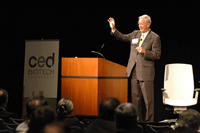
Biotech 2010 Brings Industry to Raleigh



 More than 1,200 people gathered at the Raleigh Convention Center to chart out of future of biotechnology jobs in North Carolina.
More than 1,200 people gathered at the Raleigh Convention Center to chart out of future of biotechnology jobs in North Carolina.
Currently, there are 57,000 jobs in the biotechnology industry in the state, and by 2020 this number could grow to 120,000.
The Biotechnology Center is at the event today and Tuesday covering CED's Biotech 2010. Our coverage is linked below.
Matches Made at Biotech 2010 - Small and large companies got together to talk technology.
OPENING REMARKS
In its 19th consecutive year, the Biotech Conference has already brought in more than 1200 registered attendees - more than ever. Interestingly, this year's event brought in the most venture capitalist professionals ever. CED President Joan Siefert Rose opened the event early this afternoon by introducing Gov. Bev Perdue via video in Washington, D.C.
Perdue urged conference attendees to work together and exchange ideas to create jobs and grow the biotech industry in North Carolina. She stated that the North Carolina Biotech industry accounts for more than 180,000 jobs and 45.8 billion in economic activity.
CEOs TALK LEADERSHIP
Adversity can be good for growing bioscience companies, according to a panel of CEOs representing a cross-section of North Carolina pharmaceutical success.
Despite the global economic meltdown, the six corporate leaders on the podium during the Tuesday-morning session had successfully shepherded $850 million onto their balance sheets in just the past year.
Venture capital, federal vaccine funding and sales of public shares fed the fires of these companies. But the harsh economic environment also brought valuable opportunities for the CEOs, their directors and employees to renew their focus on priorities and do more with less.
The panel, introduced by Vipin Garg, Ph.D., president and CEO of Tranzyme Pharma, was moderated by Christy Shaffer, Ph.D., outgoing president and CEO of Inspire Pharmaceuticals. Shaffer got a standing ovation from the hundreds attending the session -- payback, in part, for her years of community support as she built Inspire from her salad days as the company's first employee.
Panelists included:
- J. Donald deBethizy, Ph.D., president and CEO of Targacept
- Neal Fowler, CEO of Liquidia Technologies
- J. Michael Pearson, chairman and CEO of Valeant Pharmaceuticals International
- Jon Stonehouse, president and CEO of BioCryst Pharmaceuticals
LUNCHEON
The lunch program featured the presentation of two awards. Charles Hamner, chairman of the Hamner Institutes for Health Sciences and past Biotechnology Center president, presented the CED Biotechnology Leadership Award to Randall Marcuson, former CEO of Embrex
Instead of talking about himself, Marcuson spent the entirety of his acceptance speech attributing about his employees and what they do to make Embrex successful.
"This award is really about them and on their behalf, I thank you very much," Marcuson concluded.
ROSES, CABERNET, SHIRAZ, ZINFANDEL
Many in the crowd of more than 1,000 diners at Tuesday's Biotech 2010 luncheon were struggling to understand the fast-paced, multi-layered PowerPoint presentation by research scientist Allen Roses, M.D., but the wine lovers among them found his spin-out companies intriguing.
For example, he formed Cabernet Pharmaceuticals in Raleigh as a pharmacogenetics and project-management consultancy focused on helping large pharmaceutical companies improve their chances for success when developing new drugs.
Profits from Cabernet fund Durham-based Shiraz Pharmaceuticals, a companion diagnostics commercialization company.
Roses described another of his creations, Zinfandel Pharmaceuticals, as a therapeutics-development company focused on Alzheimer's.
Roses, who left a long career at Duke University in 1997 to become a senior vice president for genetics research and pharmacogenetics at GlaxoSmithKline, returned to the Duke University School of Medicine in 2008 to lead a newly established Deane Drug Discovery Institute.
Around the same time, Roses said, he also took out a second mortgage on his home to fund the winey start-up companies to commercialize his idea for concurrently developing and testing a unique gene-based diagnostic tool to predict individuals' likelihood of developing Alzheimer's within about five years of being tested -- and producing a resulting treatment to thwart the onset of the brain disorder.
Roses described in words and projections his unusual, complicated clinical trial method, which he said received acceptance from the United States Food and Drug Administration last October.
During most of his Duke tenure Roses led research to uncover genetic links associated with the development of Alzheimer's disease. He is probably most well known for his work surrounding the discovery of the ApoE4 gene that has been found to predispose those with the gene to develop Alzheimer's.
LICENSING FOR EMERGING BIOTECH COMPANIES
Panelists from Targacept, GlaxoSmithKline, Eli Hoffman-LaRoche and Astra-Zeneca participated in a panel on Licensing Best Practices for Emerging Companies. Coming from both biotechnology and business backgrounds, the panel had a lot to offer.
Jon McGarity, executive vice president of marketing at Campbell Alliance, served as moderator of a session that discussed the difficulties of the past couple years, and what changes will be made to improve the market in the coming years.
"'09 was difficult, certainly not as difficult as '08 was," McGarity said.
"I think 2009, quite frankly, was the biggest year we had in many, many years. We were able to close a few deals during the year," said Mark A. Miller, vice president of corporate business development at Eli Lilly and Company.
"I think it was a really good year for deal-making," added David Donabedian, vice president of strategic alliances, U.S. CEEDD at GlaxoSmithKline.
As promised in the program agenda, the current hot areas of pharma were cited: Oncology, rheumatoid arthritis, COPD, Alzheimer's disease, and "orphan drugs".
"I think there will be a large focus on big, unmet needs (like oncology, rather than orphan drugs)," said Steve Rushton, senior business development director of neuroscience at AstraZeneca.
"Not all drugs will end up on the market, but it's certainly good that we're trying," added Bob Silverman, global licensing director at Hoffman-LaRoche.
The executives stressed that most of them were scientists first, and believe in supporting emerging biotechnology companies.
"We're not your enemies, we're your advocates," Donabedian said.
"We're deal people, we like to put deals together," Rushton added.
